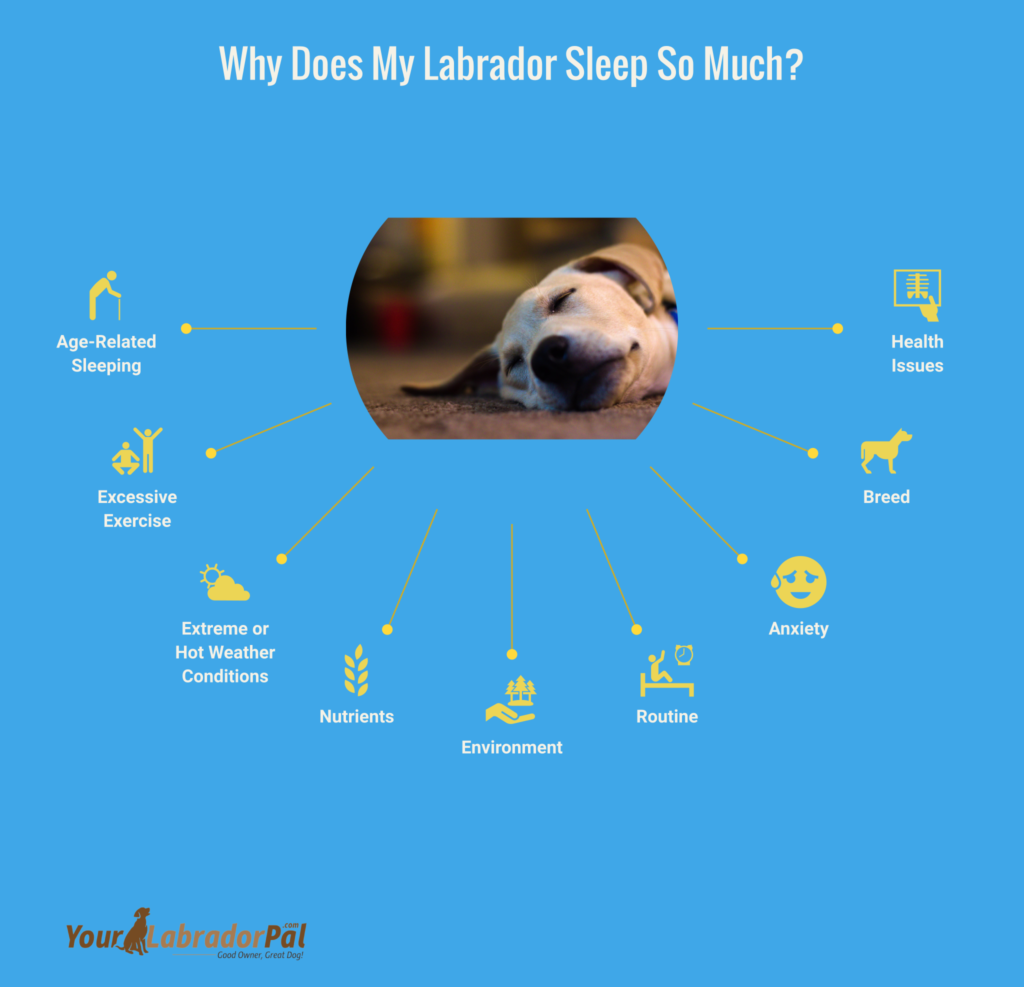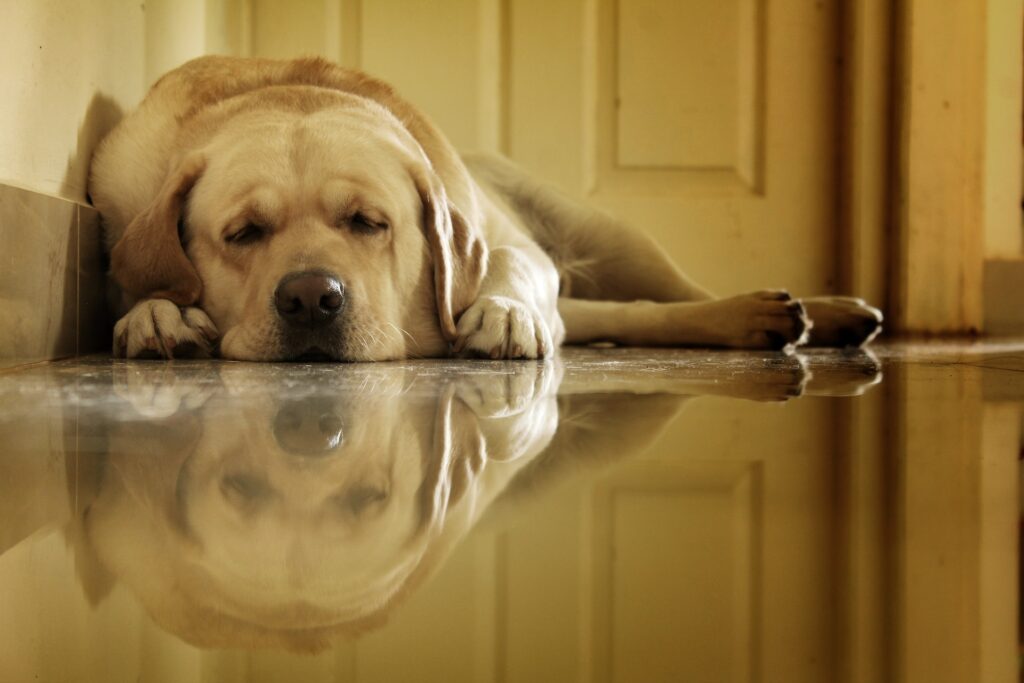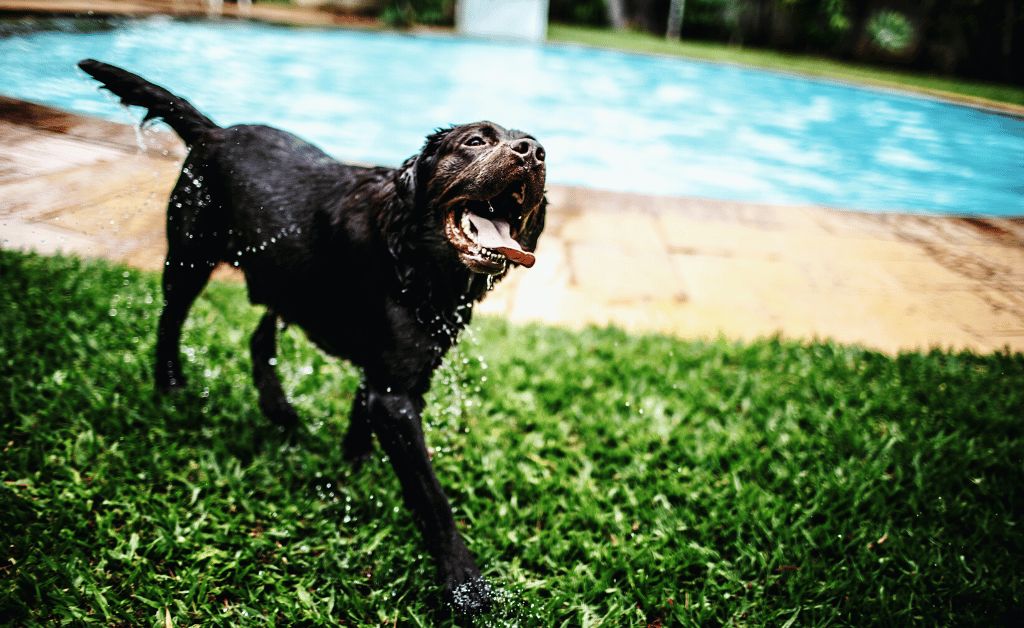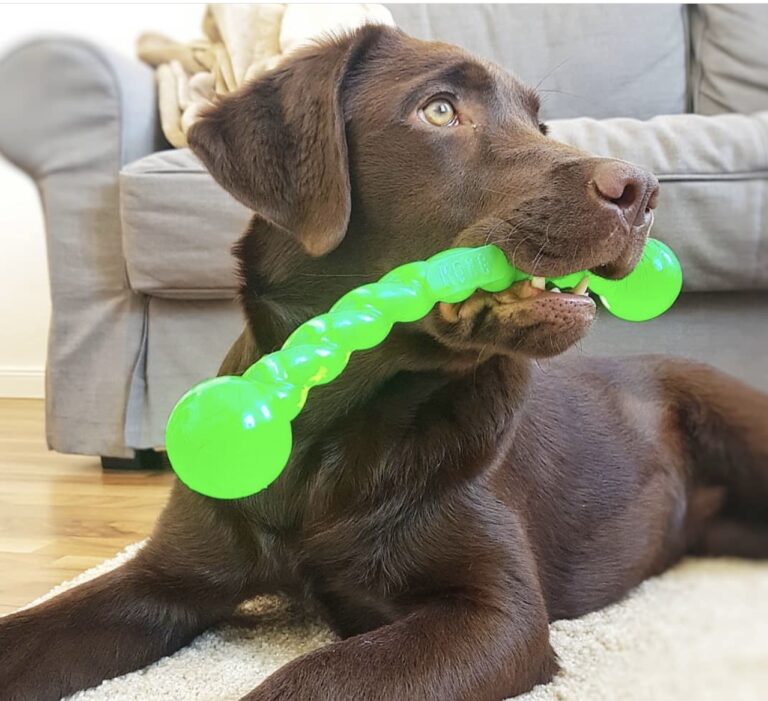Why Does My Labrador Sleep So Much?
Are you worried about why does Labrador sleep so much? Perhaps you have ever looked at your beloved furry friend and wondered why they spend so much time sleeping. It seems like every time you turn around, they’re curled up in a ball, sleeping away.
Well, put simply, Labradors sleep a lot because they need it! These lovable pups require significant rest to function at their best. However, what is too much sleep in a Labrador? We will answer this question and help you better understand why my labrador sleep so much and what you can do about it.
Do Labs Usually Sleep All Day?
While it’s true that these pups love a good nap, sleeping all day is different from their typical behavior. In fact, Labs are known for their high energy levels and playful demeanor, which means they need plenty of exercises and mental stimulation to keep them from getting bored or restless. While it’s true that some Labs might enjoy the occasional nap, they shouldn’t be sleeping all day long.
Just like humans, the amount of sleep a Labrador Retriever needs varies depending on their age, activity level, and overall health condition. On average, adult Labradors need 12 to 14 hours of sleep daily. However, puppies and senior Labradors may require more sleep, ranging from 18 to 20 hours daily. Keep in mind that providing your Labrador Retriever with enough rest is crucial for their physical and mental well-being.
Why Does My Labrador Sleep So Much?
Your Labrador sleeping all day might be a cause for concern, making some dog owners worried about the health of their Labrador Retriever. However, there could be several factors that are causing your Labrador to sleep more than usual.
🐾Age-Related Sleeping
Different age groups have different dog sleep patterns. Puppies and senior dogs sleep more sleep than young adult dogs as they have varying energy levels. Your puppy sleeping for extended periods shows their body growing and developing, while your senior dog requires more rest.
🐾Excessive Exercise
If your Labrador is getting more exercise than usual, they require more sleep. Going on long walks, hiking, swimming, or training can tire your puppy out, making them need more rest. As a pet owner, it’s essential to keep things in moderation to prevent over-exhaustion from too much physical activity.
🐾Extreme or Hot Weather Conditions
Sleep and temperature have a close association. Like humans, dogs’ body temperature drops when they sleep, contributing to them sleeping for more extended periods in cold weather conditions.
🐾Nutrients
A balanced diet ensures your dog has enough nutrients to remain healthy. A lack of certain nutrients, such as amino acids or vitamin B, can cause your dog to become lethargic and sleep more.
🐾Environments
Changes in your dog’s surroundings can disrupt its sleeping pattern. For instance, moving to a new home can affect their sleeping habits as they get used to their new surrounding. Ensure you give your lab puppy enough time to adjust to its new environment.
🐾Routine
It’s essential to have a solid routine that can help regulate their sleep patterns. Setting up a regular exercise and feeding schedule will help your dog establish a circadian rhythm.
🐾Anxiety
Anxiety and stress can cause a dog to become restless, sleepless, or excessively napping to escape their troubles. Work with your veterinarian or pet behaviorist to help your dog alleviate stress and anxiety disorders.
🐾Breed
Different breeds sleep for different reasons. Larger breeds like Labradors can sleep more due to their calmer disposition and energy levels than smaller and more energetic breeds like Jack Russell Terriers.
🐾Health Issues
While snoozing dogs may seem like the norm, excessive sleeping can indicate some health concerns. Heart disease, diabetes, arthritis, hypothyroidism, liver and kidney diseases, and even bladder infections can all lead to your furry friend dozing off more often than not. If you suspect any of these illnesses, consult your veterinarian.
Overall, it’s important to remember that sleeping is a natural part of a dog’s life. While excessive sleep can indicate an underlying problem, it isn’t necessarily something to worry about if your Labrador has other visible signs of health and normal behavior.
How to Spot a Tired Labrador
As mentioned, excessive sleeping can be a sign of an underlying health issue. However, in most cases, it’s just your Lab getting the rest they need. To tell if your Labrador is tired or not, look out for the following signs:
👉Yawning
When Labradors are tired or sleepy, they tend to yawn more frequently than usual. Yawning is a natural physiological response that helps increase brain oxygen and relieve tension. However, excessive yawning can also be a sign of stress or boredom, so it’s essential to watch your pet and ensure they’re getting enough rest.
👉Droopy Ears and Eyes
You may notice that their ears and eyelids droop and may even look sad or lethargic. If you see this behavior in your Labrador, let them take a nap or some rest time.
👉Less Active
If your playful and energetic dog suddenly becomes less interested in playing or going for a walk, it’s time to take a break. Let your Labrador rest and recharge its batteries so they’re ready to go again the next time you want to have fun.
👉Slow Movements
You may notice that your Labrador is walking slowly, lying down for extended periods, or generally less active than usual. If you suspect your dog is exhausted, it’s best to take them inside and let them rest for a bit.
👉Loss of Appetite
If your Labrador suddenly stops eating, it can be due to exhaustion. They may not have the energy to eat or may not feel hungry. As a responsible pet owner, you must monitor your dog’s eating habits and ensure they get the necessary fuel to keep its energy levels up.
These signs can help you identify if your Labrador is too tired and needs a break. Make sure to monitor their behavior and provide them with enough rest time when needed.
How to Help Labrador Retriever Get Enough Restful Sleep
It’s essential to make sure your Labrador gets enough restful sleep. Here are a few tips to help ensure that your Labrador is getting its much-needed rest:
✔️Provide a Comfortable Bed
A comfortable bed helps your Labrador to relax and sleep. You should choose a bed that supports your body weight and size. Small beds that force your lab to curl up can cause discomfort and poor circulation. On the other hand, large beds that don’t hold their body shape don’t offer enough support.
Orthopedic beds and mattresses with memory foam are your best bet if your Labrador has joint problems or is older. It’s important to place your dog’s bed in a quiet area free from distractions and sounds.
✔️Make the Room Dark
Like humans, dogs are affected by light and dark, which can be the difference between a restful sleep and a restless one. Darkness helps their brains to release melatonin, a hormone that regulates their sleep-wake cycle. Invest in blackout curtains or shades to ensure the room is as dark as possible. This will help train your lab to sleep more restfully at night and not to be easily awakened by lights outside.
✔️Create a Soothing Ambiance
The right ambiance can help your Lab to find peace and tranquility. Essential oils such as lavender have calming properties and can make their sleeping environment more peaceful. Additionally, a sound machine playing white noise, soothing music, or nature sounds can help block distractions and create a peaceful sleep environment.
✔️Create a Bedtime Routine
A bedtime routine can help your lab prepare their mind and body for sleep. You can start by taking your dog on a short walk or doing a calming activity before bed, such as a gentle massage. This will signal to your Labrador that they can start to relax before bedtime and wind down.
✔️Keep Your Lab’s Bed Clean
Last but not least, keeping your lab’s bed clean is crucial. Dirt, hair, and bacteria can accumulate on your dog’s bed, which can cause allergies and other health problems. Ensure that their bed covers are removable and can be washed easily. It will keep their sleeping area clean and odor-free.
✔️Consider Natural Sleep Aids
Many natural sleep aids can help your Lab get the best rest possible. Lavender oil can be added to a diffuser or sprayed on their bed to promote relaxation. Chamomile tea can also be calming when added to their water dish. Always consult with your veterinarian before trying any new sleep aids.
These tips should help your Labrador Retriever get the restful sleep they need to stay healthy.
The Importance of Vet Check-ups for Your Pet’s Sleeping Habits
If you’re too concerned about why does my labrador sleep so much after trying the measures above, it’s best to have your Labrador checked by their veterinarian as they can:
❕Detect Any Underlying Health Conditions
During a regular vet check-up, your vet will analyze your pet’s overall health, including sleeping patterns. This helps them detect any underlying health conditions affecting your pet’s sleep. For instance, if your pet has dental problems, it can cause discomfort and disrupt their sleep. Your vet can diagnose such issues and recommend treatment, so your pet can sleep soundly.
❕Proper Nutrition
Diet plays a big role in your pet’s health and sleep cycles. During a vet check-up, your vet can offer expert advice on the best diet for your pet to ensure they maintain a healthy weight and get all the necessary nutrients for optimal health, including good sleep. If your pet is overweight, your vet will recommend a suitable meal plan to help normalize their weight, increasing their chances of getting quality sleep.
❕Treating Sleep-Related Conditions
If your pet has trouble sleeping, it could be a sign of a sleep disorder such as sleep apnea or restless leg syndrome. Your vet can identify these conditions and recommend necessary therapies or medications to help your pet sleep better. For instance, if your pet has sleep apnea, your vet may recommend a CPAP machine, which may take a little getting used to but can help your pet sleep soundly.
❕A Regular Sleep Schedule
Your vet can help you identify these conditions and recommend stress-reducing measures, a calming environment, or medication. It will help your pet stay active and alert during the day, ensuring they get enough restful sleep at night.
These measures can help your lab sleep peacefully and give them the best chance to stay healthy and active.
Frequently Asked Questions
1: Is it normal for a dog to sleep 20 hours a day?
Dogs are known for their love of lounging around and napping, but is it normal for them to sleep as much as 20 hours a day? In most cases, yes! Puppies and senior dogs, in particular, tend to sleep more than adult dogs. However, if your dog seems excessively lethargic and unresponsive even when awake, it’s important to take them to the vet to rule out potential health problems.
2: How do I know if my dog is depressed?
Dogs can experience depression just like humans can. Look out for a few signs if you suspect your dog is feeling down. Lack of appetite, sudden weight loss, and disinterest in activities they once enjoyed are all potential indicators of depression. If you’re concerned, taking your dog to the vet is essential to rule out any underlying health problems and discuss potential treatment options.
3: Do happy Labradors sleep a lot?
Labradors, like many other breeds of dogs, can sleep for a significant portion of the day – up to 14 hours! However, the amount of sleep a dog requires can vary based on factors like age, activity level, and diet. Just because your Labrador is sleeping doesn’t mean they aren’t happy. In fact, a well-rested dog is likely a happy dog!
4: What are the red flags in dog health?
As a dog owner, it’s important to be aware of any potential health problems your pup may be experiencing. Some common red flags include lack of appetite, sudden weight loss or gain, excessive thirst, lethargy, vomiting, diarrhea, and difficulty breathing. If you notice any of these signs in your dog, it’s essential to take them to the vet as soon as possible.
5: How can I soothe my dog at night?
Creating a soothing, peaceful atmosphere for your pup to sleep in is key. Make sure the room is warm enough and provide comfortable bedding. Some dogs also benefit from white noise like a fan or gentle music. Additionally, consider speaking to your vet about natural supplements or calming treatments that can help your pup sleep.
Final Words
As dog owners, it’s normal to wonder why does your labrador sleep so much. Labradors require significant physical activity and mental stimulation to remain content and healthy. While it may seem like your fur baby is always sleeping, they are generating the energy they need to meet daily activity goals.
However, if you notice your pet is sleeping more than usual, it’s important to identify the underlying cause and bring them to the vet. Doing so will give them the best chance to stay healthy and active.











